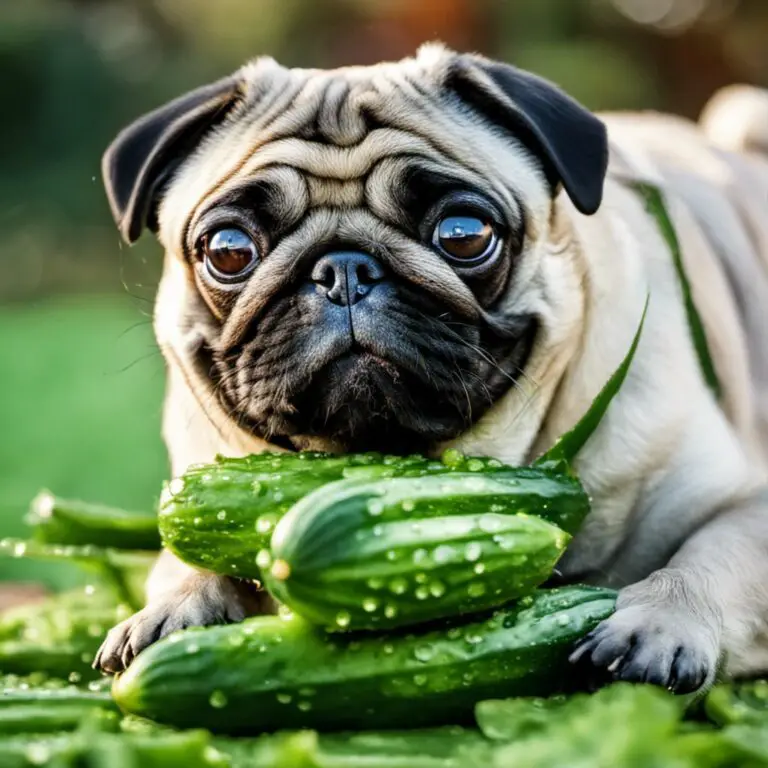Can Pugs Eat Tuna? Essential Facts For Dog Owners
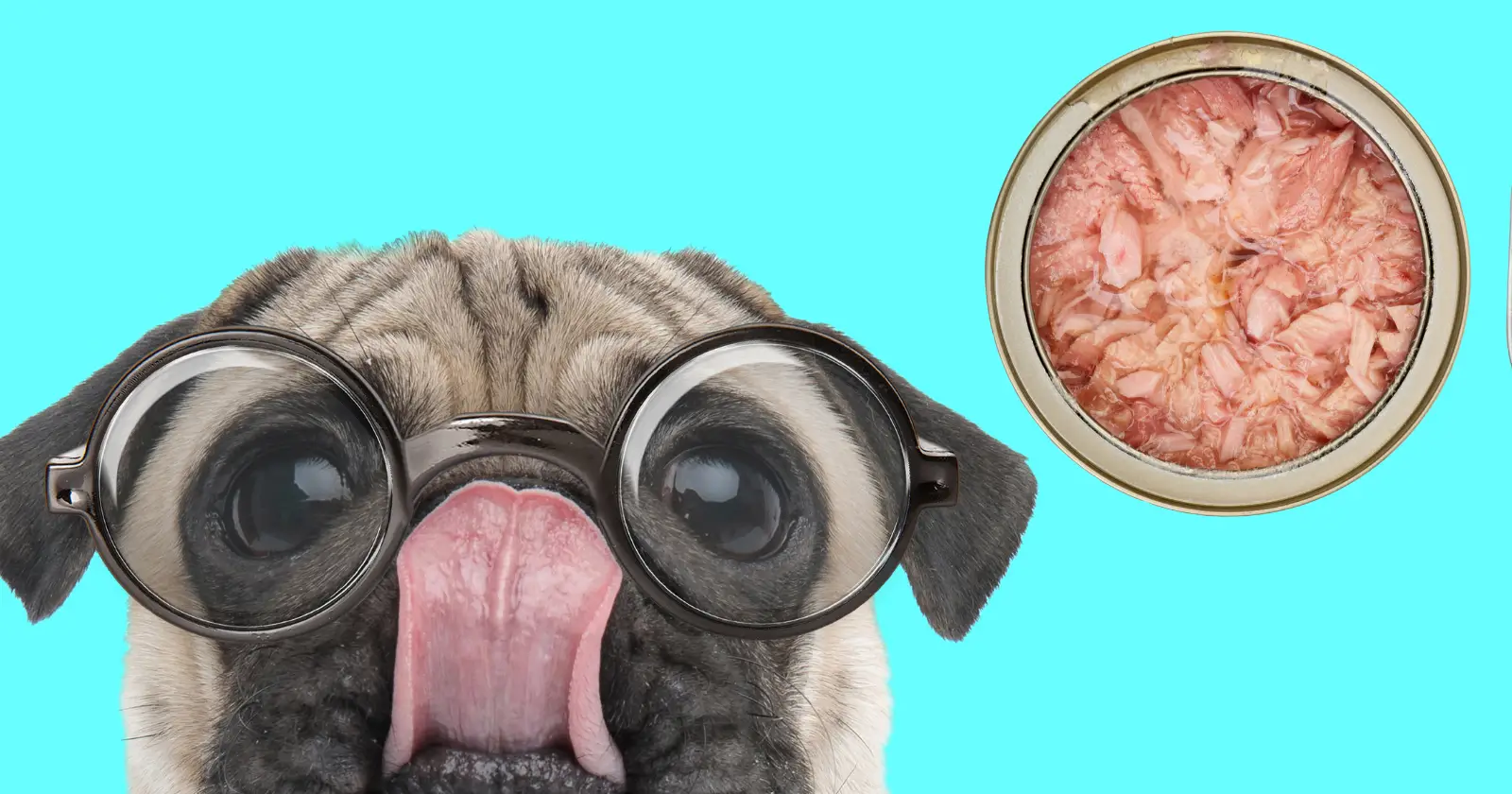
As a pug owner, you might wonder if feeding your furry friend tuna is safe. Tuna is a popular addition to many human diets due to its numerous health benefits and rich nutrient content. However, what might be good for us may not always be suitable for our canine companions.
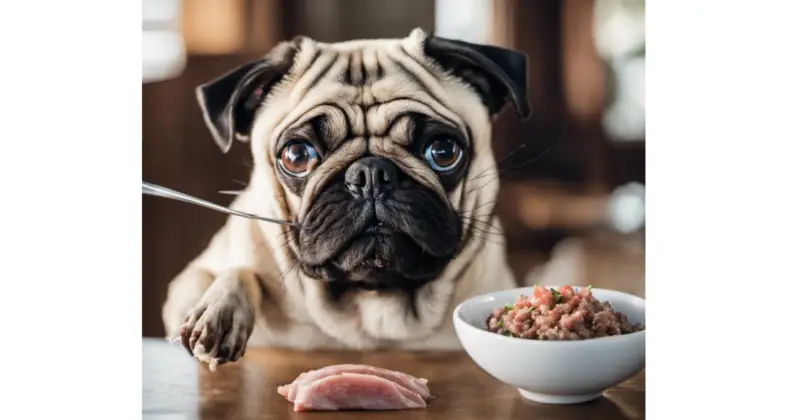
Tuna is not toxic for pugs and is indeed found in some high-quality dog foods because it contains essential nutrients like selenium, magnesium, vitamin D, iodine, choline, potassium, and phosphorus. These provide your pup with the nutrients their body needs. While it’s safe for pugs to consume tuna, it’s essential to ensure you serve it correctly to avoid potential health issues.
It’s crucial to understand that the preparation and type of tuna being served to your pug can impact its safety. For instance, canned tuna may contain high levels of salt, which could be harmful to your dog. Feeding the right kind of tuna and keeping it to a reasonable limit is the best way to ensure your pug enjoys this fish without any adverse effects.
Contents
Table of Contents
Understanding Pugs And Their Dietary Needs
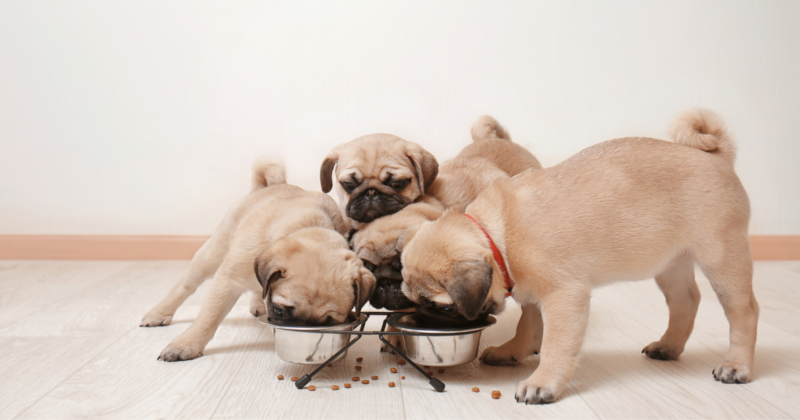
As a pug owner, it’s essential for you to understand their specific dietary requirements. To maintain a healthy lifestyle, pugs should be fed dog food containing the right balance of nutrients and the appropriate number of calories depending on their age, weight, and activity level.
Get The Free Food Eating Guide That Keeps My Pug Happy and Playful Even at 13 Years Old
100% Beginner Friendly & Lists Real Foods Your Pug Can Actually Eat!

Pugs are known to have a hearty appetite, but it’s crucial to feed them in moderation to prevent obesity and other health problems. On average, a pug puppy requires 50 calories per pound of body weight. Adult pugs need about 40 calories per pound, while senior pugs require fewer calories, as they tend to have slower metabolisms and lower activity levels.
Protein is essential to your pug’s diet, making up around 18% of their overall food intake. Be cautious not to provide more than 22% of protein in their diet, as excess protein can cause health issues.
When it comes to selecting dog food, opt for a high-quality brand that meets your pug’s specific nutritional needs. Fish, like tuna, can be a great protein source as it is rich in nutrients such as selenium, magnesium, vitamin D, iodine, choline, potassium, and phosphorus. These nutrients are essential for maintaining your pug’s overall wellbeing.
Your pug’s energy requirements may vary depending on their activity level, size, age, and health condition. Make sure to monitor their weight and adjust their food intake accordingly. Regular vet check-ups can also help you keep your pug in optimal health.
In addition to store-bought dog food, you can offer your pug appropriate treats in moderation. Some pug-friendly treat options include carrots, apples, and tuna. Providing a variety of healthy foods can help keep your pug interested in their meals and ensure they receive the necessary nutrients for a happy and healthy life.
Can Pugs Eat Tuna?
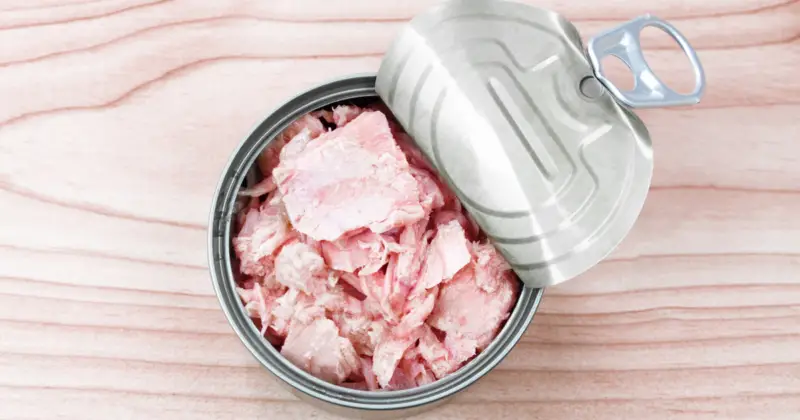
Yes, pugs can eat tuna. In fact, tuna is a common ingredient in many high-quality dog foods, providing essential nutrients like selenium, magnesium, vitamin D, iodine, choline, potassium, and phosphorus for your pug’s health source. However, being mindful of how you feed tuna to your pug is essential to ensure their safety and well-being.
When preparing tuna for your pug, it is best to avoid saltwater fish, as it can lead to various health problems source. Fresh tuna is preferred over canned tuna since canned varieties may contain high levels of sodium that can be harmful to your pug. Additionally, be cautious about mercury levels in some types of tuna, which can pose health risks to your pet source.
Besides tuna, other fish options like salmon and sardines can also provide excellent sources of vitamins, protein, and calcium-rich, digestible bones for your pug source. When feeding any fish to your pug, always ensure it is thoroughly cooked and free of any bones, spices, or oils.
In summary, when fed properly and in moderation, tuna can be a nutritious and delicious protein source for your pug. Keep in mind the potential health risks associated with certain types of tuna, and always prioritize fresh, cooked fish over canned or saltwater options. Remember to keep an eye on your pug’s overall diet to ensure they receive a well-rounded, balanced nutritional intake.
The Nutritional Value of Tuna
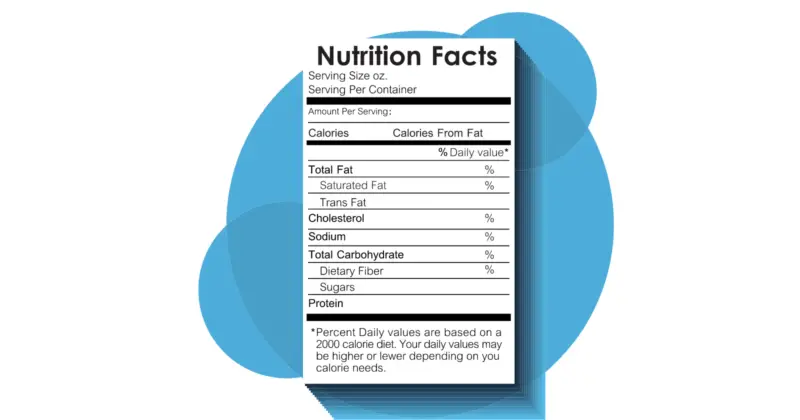
Tuna is a nutrient-dense food that can offer numerous health benefits for you and your pug. Packed with essential nutrients, tuna has several key components that make it an attractive addition to a dog’s diet.
Tuna is an excellent source of protein, an essential component for muscle development and overall bodily function. The high-quality protein in tuna supports your pug’s body, helping ensure their muscles, bones, and organs stay strong and healthy.
Another important component of tuna is its fat content, particularly its omega-3 fatty acids. These fats are known for their anti-inflammatory properties, which can improve your pug’s skin, coat, and overall well-being. Omega-3 fatty acids also play a crucial role in promoting brain health, which is beneficial for your pug’s cognitive development and function.
In addition to protein and healthy fats, tuna is rich in various vitamins and minerals. Some of the notable vitamins found in tuna include vitamin D, essential for bone health, and choline, which supports optimal liver function and brain health. Key minerals in tuna are selenium and magnesium, which contribute to a strong immune system and overall well-being.
Here is a summary of tuna’s nutritional benefits for your pug:
- High-quality protein for muscle and overall body function
- Omega-3 fatty acids for skin, coat, and brain health
- Vitamins D and choline for bone and cognitive development
- Minerals like selenium and magnesium for overall well-being
Incorporating tuna into your pug’s diet may provide them with a boost of essential nutrients and offer multiple health advantages. However, moderation is crucial, as too much tuna can have negative consequences, such as potential exposure to mercury. So when feeding your pug tuna, it’s best to do so in small amounts and select high-quality canned or cooked fresh tuna to ensure their health and safety (source).
Potential Risks of Feeding Tuna to Pugs
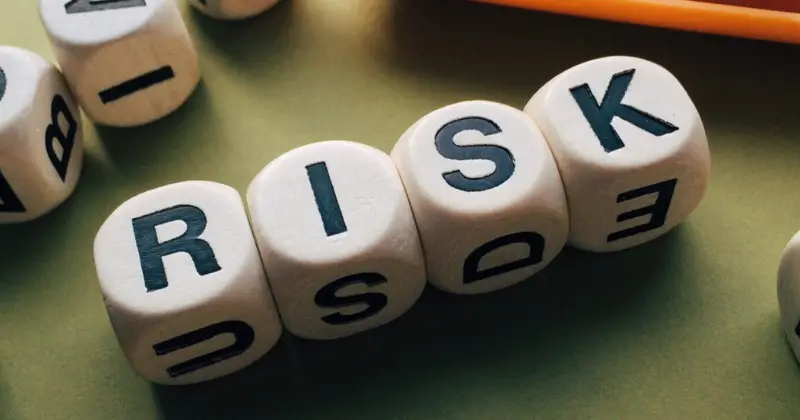
Feeding tuna to your pug may seem like a tasty treat, but you should be aware of potential risks and health concerns. One of the primary concerns when feeding tuna to your pug is the possibility of mercury exposure. Like many other fish, tuna can contain high levels of this toxic heavy metal, which can lead to mercury poisoning in severe cases.
Mercury poisoning occurs when a dog ingests excessive amounts of mercury. This can cause a variety of symptoms, including loss of coordination, muscle weakness, and even more severe issues like organ damage. In the long term, a buildup of mercury in your pug’s system could lead to significant health problems.
Another issue with feeding tuna to your pug is the potential for raw fish-related problems. For instance, raw tuna may contain parasites or bacteria that can make your dog ill. Additionally, raw fish contains an enzyme called thiaminase, which inhibits the absorption of vitamin B1. However, cooking the fish eliminates this enzyme and reduces the risk posed by parasites and bacteria, making it a safer option for your pug. It is essential to avoid giving your pug any raw tuna.
While tuna itself is not toxic, certain additives found in canned tuna can pose risks for your pug. For example, some canned tunas can contain oils or high amounts of sodium, which can be harmful to your dog’s health when consumed in large quantities. To keep your pug safe, choosing tuna packed in water and without any added oils is best.
It’s also worth noting that not all fish carry the same risk in terms of mercury content. Salmon, for example, is typically lower in mercury than tuna and therefore may be a safer option when considering fish-based treats for your canine companion.
In summary, it’s essential to consider the potential risks of feeding tuna to your pug. Be cautious with mercury content, avoid raw tuna, and opt for canned variants without harmful additives.
Proper Ways to Serve Tuna to Pugs
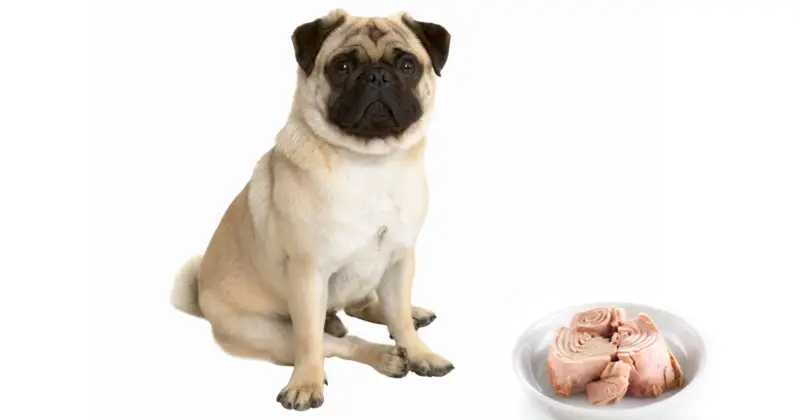
When served properly, tuna can be a healthy addition to your pug’s diet. To ensure your pug gets the nutritional benefits of tuna without any harmful effects, follow these guidelines while serving tuna to your pug.
Firstly, always opt for cooked tuna instead of raw tuna. Raw fish may contain harmful parasites or bacteria that could affect your pug’s health. So, make sure to cook the tuna thoroughly before feeding it to your pug.
Choose the tuna packed in water rather than oil when offering canned tuna. Tuna in water has a lower calorie and fat content, making it a better option for your dog. Remember to drain the liquid thoroughly to reduce the sodium content further.
Avoid adding any seasonings to the tuna. Spices, garlic, onion, and salt can be harmful to your pug. So, it’s best to keep the tuna plain and unseasoned.
Tuna should be given as an occasional treat and not become a daily part of your pug’s diet. Too much tuna can lead to mercury poisoning due to the high levels of mercury found in the fish. Giving tuna as a treat once in a while is a great way to provide your pug with the protein and omega fatty acids present in the fish without putting their health at risk.
In summary, to safely serve tuna to your pug, you should provide cooked and unseasoned tuna, preferably canned and packed in water, as an occasional treat. Following these guidelines will help your pug enjoy the benefits of tuna without any negative consequences.
Health Concerns Associated With Tuna Consumption in Pugs

Feeding your pug tuna may seem like a nutritious option, as tuna is rich in essential nutrients such as selenium, magnesium, and vitamin D. However; there are several health concerns associated with tuna consumption in pugs that you should be aware of before including it in your dog’s diet.
Firstly, exposing your pug to tuna can lead to inflammation issues, as tuna contains relatively high levels of omega-6 fatty acids compared to the more beneficial omega-3 fatty acids. These imbalances could potentially contribute to chronic inflammation problems, affecting your pug’s overall health in the long term.
Another risk is the possibility of your pug experiencing gastrointestinal discomfort after eating tuna. This may present itself in the form of vomiting or diarrhea, which is your pug’s body’s way of eliminating an irritant from the digestive system. If your pug is sensitive to the ingredients in tuna, it may cause more harm than good when consumed.
Moreover, continuous exposure to tuna could potentially increase the risk of health problems due to toxins, including heavy metals like mercury commonly found in fish. High levels of mercury in your pug’s system can significantly affect their nervous system and might also contribute to the development of cancer.
Pancreatitis is another health concern that can arise from feeding your pug tuna. The condition is caused by inflammation of the pancreas, and consuming high-fat fish like tuna might trigger flare-ups in dogs prone to this condition.
Additionally, the calorie content in tuna might contribute to weight gain in your pug, causing obesity and related health concerns. Pugs are already prone to obesity, and managing their weight is crucial for their overall health and well-being. Therefore, providing them with a balanced diet is essential to avoid weight-related issues.
Lastly, while not directly tied to tuna consumption, it’s worth noting that your pug’s overall nutrition can greatly impact their mental health. An unbalanced or unhealthy diet might contribute to depression and anxiety in your pet. Ensuring a well-rounded diet with all the necessary nutrients will help maintain your pug’s physical health and emotional well-being.
In conclusion, while tuna might provide some essential nutrients, the potential health risks associated with its consumption in pugs must be considered. Speak to your veterinarian about the best dietary options for your pug, and if tuna is safe for your pet in moderation or should be avoided altogether.
Can Pugs Eat Tuna? How much?
Suitable Alternatives to Tuna
While tuna can provide some nutritional benefits for your pug, there are several other options that might be healthier and safer alternatives. Here are a few suggestions for alternative proteins and other foods to consider for your pug:
Chicken: This lean meat is a great source of protein and is generally well-tolerated by dogs. Cooked, unseasoned chicken can be easily added to your pug’s diet; just remember to remove any bones before serving.
Eggs: Offering a good source of protein and essential amino acids, eggs are a fantastic option for your pug. Serve cooked eggs to your pug, as raw eggs can pose a risk of salmonella.
Turkey: Like chicken, turkey is an ideal lean meat that can be introduced to your pug’s diet. Make sure to remove any skin and bones, and avoid seasoning, as some ingredients can be harmful to dogs.
Quinoa: As a protein-packed grain, quinoa can provide an excellent source of nutrients for your pug. Make sure to rinse it well and cook before serving, as raw quinoa can cause digestive issues.
Carrots: Rich in vitamin A and fiber, carrots make for a perfect, crunchy treat for your dog. You can serve them raw or cooked, but make sure to cut them into smaller pieces to avoid choking hazards.
Broccoli: This nutrient-dense vegetable can provide a healthy, low-calorie snack for your pug. To keep your pug safe, cut the broccoli into small, easy-to-chew pieces and serve it steamed without any salt, oil, or seasonings.
Fruits: While not all fruits are safe for dogs, several can be a tasty and healthy snack for your pug. Apples (without seeds), blueberries, and bananas are excellent options, but always ensure to serve them in moderation.
By incorporating these alternative foods into your pug’s diet, you provide a balanced and varied selection of nutrients, ensuring they remain healthy and happy.
Disallowed Foods for Pugs
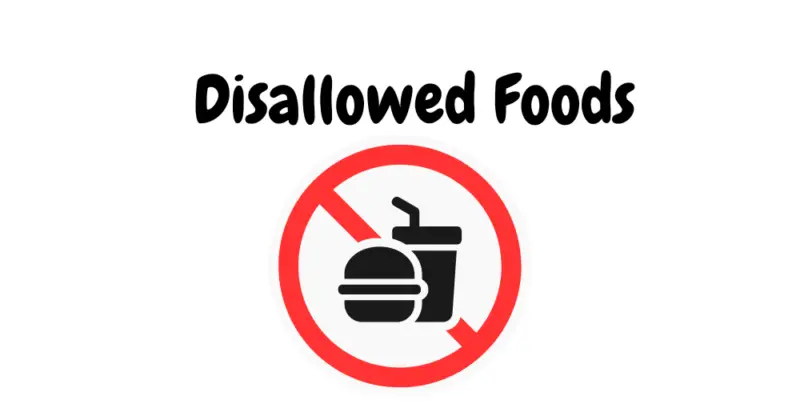
While it’s true that pugs can safely eat tuna, there are some foods that you should avoid giving them. It’s important to be aware of these dangerous foods, as they can be toxic and lead to health issues for your pug.
Firstly, onions, garlic, and other Allium family members are highly toxic for pugs. They can cause red blood cell damage and make your pug feel unwell. Whether cooked, boiled, or raw, your pug should never eat onions, garlic, leeks, or chives. Avoid giving them any dishes or treats containing these ingredients.
Although considered healthy for humans, avocados should not be fed to pugs. They contain a substance known as persin, which is harmful to dogs. It can lead to vomiting, diarrhea, and other digestive issues. Keep your pug away from avocado and any food products containing this fruit.
Another item to avoid is moldy or stale food, especially dry kibble. Moldy food can produce mycotoxins that can make your pug sick if ingested. Make sure to store your pug’s kibble in a dry, cool place and check for any signs of mold before serving.
In general, always be cautious when introducing new foods to your pug’s diet, and consult your veterinarian if you’re unsure about a specific food item. Keep your pug’s health and safety at the forefront of your mind when feeding them, and avoid the disallowed foods mentioned above.
The Takeaway: Can Pugs Eat Tuna
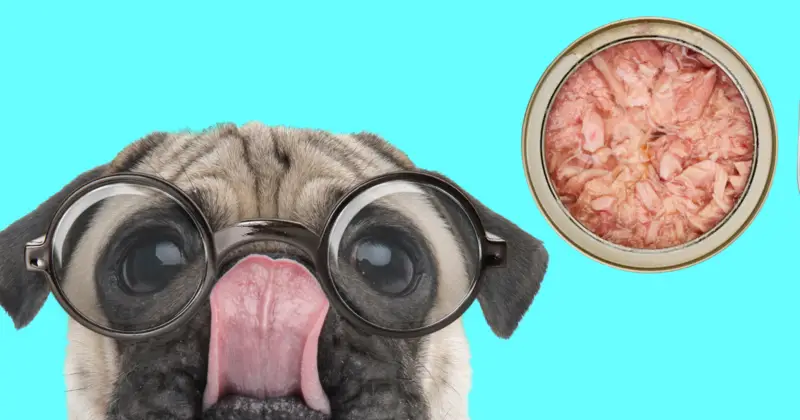
As a pug owner, understanding tuna’s nutritional benefits and potential risks is essential for your pup’s well-being. Tuna can indeed be a healthy part of your pug’s diet, as it is not toxic and provides essential nutrients like selenium, magnesium, vitamin D, iodine, choline, potassium, and phosphorus. These nutrients contribute to your pug’s core health and energy levels.
While incorporating tuna into your pug’s diet, it is crucial to ensure that it’s prepared safely. Canned tuna is the most suitable option, specifically in water and low in sodium. However, avoid serving your pug tuna packed in oil or with added salt. Also, take note that excessive fish consumption could lead to mercury buildup, which can be detrimental to your pug’s health.
You can try canned tuna and egg treats if you’re looking for a tasty homemade treat for your pug. To make these, simply mash up a can of tuna, mix in eggs, and bake at a low temperature. The treats are delicious and offer additional protein and essential nutrients.
In conclusion, you can confidently include tuna in your pug’s diet as long as you maintain moderation and preparation safety.
Frequently Asked Questions
Is it safe for pugs to consume canned tuna?
While small amounts of canned tuna may not pose an immediate risk to your pug, it is not recommended as a regular part of their diet. Canned tuna often contains added ingredients that are unhealthy for dogs, and raw tuna can be harmful if fed regularly source.
What are the risks of feeding tuna to dogs?
One concern with feeding tuna to dogs is the potential presence of heavy metals like mercury, particularly in longer-lived species like swordfish and tuna itself source. Additionally, raw tuna can pose risks if fed regularly, and canned tuna may contain unhealthy additives.
How much tuna should I give my pug?
Generally, it is best to avoid giving your pug large amounts of tuna. If you do decide to give your pug a small treat, ensure it is a minimal portion, and only do so occasionally. Instead, consider offering alternative fish options like salmon, walleye, or trout, which are more beneficial and safer source.
Can pugs eat other types of canned fish?
Yes, pugs can eat other types of canned fish, such as salmon or sardines. Just ensure that the fish is free from added salt, and other harmful ingredients. Preferably, feed your pug fish that has been cooked and deboned to avoid potential hazards.
Is tuna beneficial for dogs with specific health issues?
While tuna does contain omega-3 fatty acids, which can support cardiovascular health and brain function source, it’s not the best option for dogs with health concerns due to the risks mentioned earlier. Instead, consult with your veterinarian for alternative ways to provide these essential nutrients for your dog’s well-being.
Can dogs consume tuna steaks or tuna salad?
Tuna steaks, if cooked properly and without any added seasonings like salt or spices, can be safer than canned tuna for occasional consumption. However, it’s still better to opt for safer fish options like salmon or trout mentioned earlier. Tuna salad should be avoided as it may contain harmful ingredients like onion, garlic, or excessive amounts of mayonnaise, which can cause digestive issues and other health problems in dogs.




